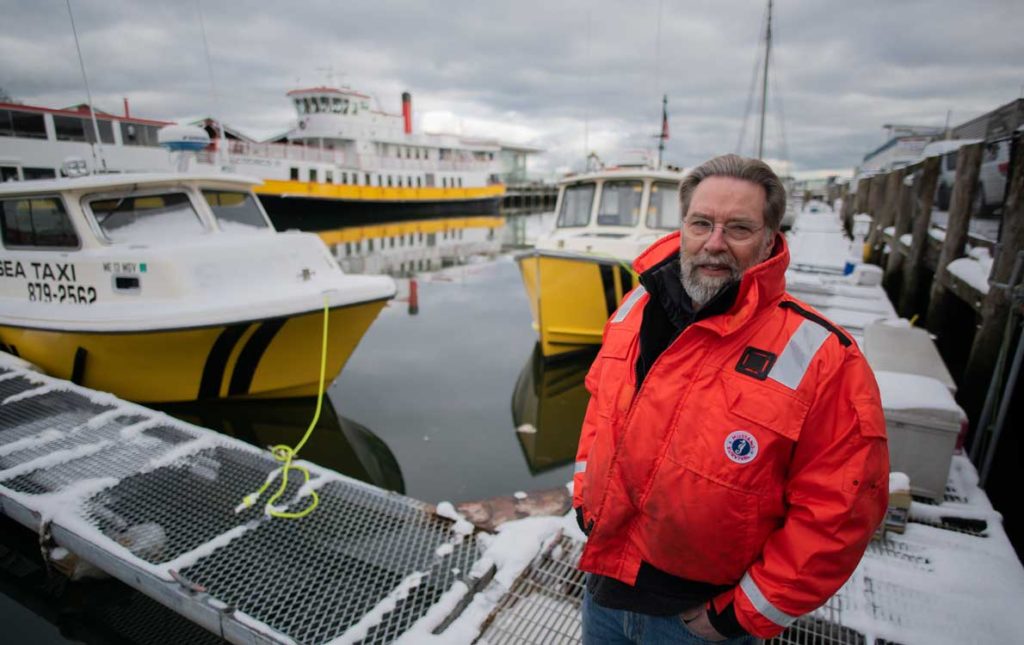By Stephanie Bouchard
With two October storms causing havoc across the state, but especially along the coast, a number of boat owners found their boats in trouble—sunk at their docks, broken free of their moorings, even too damaged to float on their own. They needed assistance with their boats, but would that assistance be a recovery service (a tow, for example) or a salvage?
“People get twisted up over salvage stuff,” said Capt. Bruce White of Southport Island, co-owner of Sea Tow Portland/Midcoast Maine, which among other things, offers vessel recovery and salvage services.
Many people are confused about marine salvage and vessel recovery. There is a difference between them—and every boat owner should understand that difference—but misconceptions about salvage often cause undue anxiety in boat owners, White said.
The biggest cause of anxiety, said White, is based on a finders-keepers misconception. When boat owners find out a marine assistance company such as his is going to salvage their boat, they panic, believing that they’re going to lose their boat, but that’s not how it works, he said.
“It’s not finders-keepers at all,” he said. “If you find a boat that’s abandoned somewhere, that’s in peril, and you do something to make it safer, better—you take control, care, and custody of it—(then) you’re entitled to a reward for your time, but it’s not your boat.”
A marine salvor can hold your boat as collateral, however, until paid for the services rendered.
Marine salvage is a federally-defined service with a specific set of criteria to be met by salvors. It applies only to marine property—boats and cargo, he said—and the salvor is entitled to a reward for properly carrying out salvage services.
To claim a salvage reward, a salvor has to meet federally-regulated criteria, foremost being: there’s a marine peril, the service is voluntarily carried out (meaning, there’s no pre-existing contract between the salvor and the distressed vessel’s owner), and persons and/or property were successfully saved.
Claiming a reward (which is usually based on a percentage of the value of the item, such as a boat, or items, in the case of cargo, salvaged) doesn’t necessarily mean a salvor will actually get paid that reward. In contested circumstances, legal action may determine if a reward is warranted and how much of a reward should be paid.
Vessel recovery services that are not deemed salvage, on the other hand, are not legislatively defined, and generally are billed on an hourly or flat-fee basis. He likens non-salvage vessel recovery services to the roadside assistance services drivers get through AAA.
Generally speaking, professional marine salvors will assess the situation and tell the boat owner if it is a salvage scenario or not, but boat owners can also—and should—ask the person providing assistance if the aid being offered is salvage or not.
“It’s a good question and there’s no reason not to ask that,” he said, and boat owners can turn down an offer of salvage services. There are some extreme circumstances, however, in which boat owners are legally required to take whatever steps are necessary to avoid or minimize damage to their own vessels, other vessels, or to the environment.
If the boat owner is aboard, then permission must be granted for salvage. White uses the U.S. Open Form Salvage Agreement, also known as the MARSALV contract, to lay out the terms of the salvage.
If a boat is found floating, a salvor can go and get it, he said, but, he stressed, the salvor doesn’t then own that boat. The salvor must track down who owns the boat. The owner will be liable for payment for the salvage services rendered.
Anybody can be a marine salvor, including passing boaters who come across a boat in distress. No special license is required, but to provide commercial water assistance, a captain’s license and towing endorsement from the U.S. Coast Guard are necessary, White noted.





